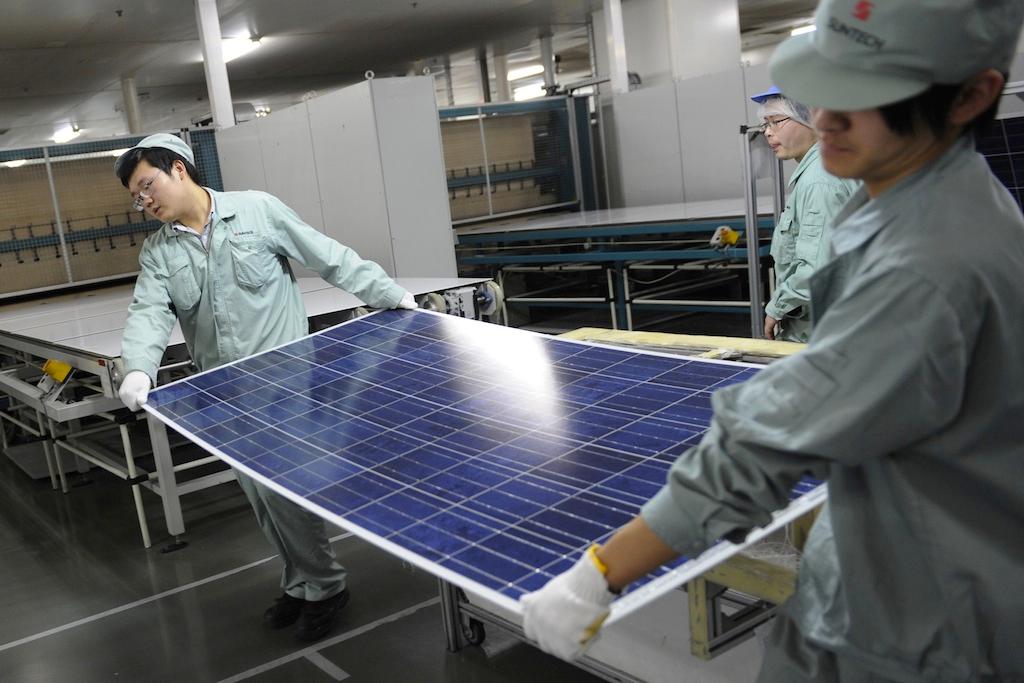Solar power tumbles back to Earth
This picture taken on Feb. 27, 2012 shows workers assembling solar panels by hand on the factory floor of Chinese company Suntech in the eastern Chinese city of Wuxi.
The excitement over solar power, which once attracted billions in private investment and public subsidies, has waned recently, underscoring the limitations of renewable energies and the unchallenged dominance of fossil fuels.
Some of the $75 billion sector's high profile names have fallen on hard times recently — most notably Suntech Power. The China-based solar panel company rattled the industry when it filed for bankruptcy last week. In its heyday, the stock traded just shy of $90 and had a market capitalization of $16 billion: on Thursday, the last day US markets were open, the shares traded around for 42 cents each.
Alternative energy advocates point out that Suntech's difficulties were specific to its business model, exacerbated by a trend of compressed industry prices that have squeezed profit margins for solar companies. The company's failure belies a US market where solar panel installations grew by 76 percent last year, according to the Solar Energy Industries Association (SEIA).
"The overall story is about growth and declining costs," said Arno Harris, chairman of the SEIA Board, in an interview. Much like the way low-cost natural gas is transforming the US energy market, "[solar] costs have come down so dramatically, it's created a Darwinian environment," Harris added.
He pointed to the collapse in silicon — a linchpin of solar panel manufacturing — which has led to a steep drop in prices per watt of solar panels. That amount is now less than a dollar, down sharply from $4 per watt a few years ago, making it difficult for companies to make money.
Yet in many ways, Suntech's spectacular fall is a microcosm of a sector in transition, and holds lessons for US solar firms. As domestic drilling and abundant natural gas has stoked expectations for US energy independence, it has also sapped attention from renewable energy.
(Read more: US Gas Exports Will Shake Up Global Market)
Although Washington still gives a nod to clean energy, gone is the flurry of incentives that once helped solar industry champions boast of one day breaking the stranglehold of fossil fuels on the economy. Public subsidies helped prop up failed companies like Solyndra, which became a political football in the 2012 elections.
"Definitely for the US, interest has cooled," said Greg Sheppard, senior director at research and analysis firm IHS. "It's certainly not like in 2008, when it was all over-hyped and sexy."
Sheppard added that there was definitive interest in developing the sector globally, but solar is now "in a reality phase. Now projects need to stand alone" in returning investments without government support.
That is more applicable than ever to Chinese companies, which critics contend have benefited from the dumping of cheap solar panel imports in US markets and government subsidies that totaled nearly $2 billion last year.
As it confronts the possibility of a slowing economy, China may be indicating that it will be less generous to solar companies and government protection.
There's a blend of both isolated incidents and some broader trends within the Chinese government recognizing that it does have to pull back
Indeed, publicly-traded solar firms bear more than a passing resemblance to dot-com companies in the wake of the bursting of the 2000 Internet bubble. Many are now confronting the realities of share prices trading far from their highs, as fiscally-challenged governments pull back on the purse strings.
Over the last year, JA Solar has lost 56 percent of its value, trading near $3.71 after hitting a high of $131.60 in 2008. Another Chinese solar panel maker, Trina Solar, has shed 52 percent year over year, while LDK Solar plunging 74 percent over last year.
In a measure of how some investors may be betting on American solar panel makers getting a leg up on their Asian competitors, US — based First Solar has risen nearly five percent over the last year. Still, the company's stock is languishing near $27 — down a whopping 91 percent from its 2008 peak above $313.
However, SEIA's Harris said that prospects for solar remain bright as renewable energy becomes more mainstream. "Solar this year will be the number two technology right behind natural gas," he said. "It's no longer this fringe thing that's a fun science experiment."
More from our partners, CNBC:
CNBC: Prolonged winter puts retail sales in deep freeze
CNBC: Why are Japan's manufacturers so bearish?
CNBC: Goodbye Apple iPhone? Wearable tech is coming
Every day, reporters and producers at The World are hard at work bringing you human-centered news from across the globe. But we can’t do it without you. We need your support to ensure we can continue this work for another year.
Make a gift today, and you’ll help us unlock a matching gift of $67,000!
